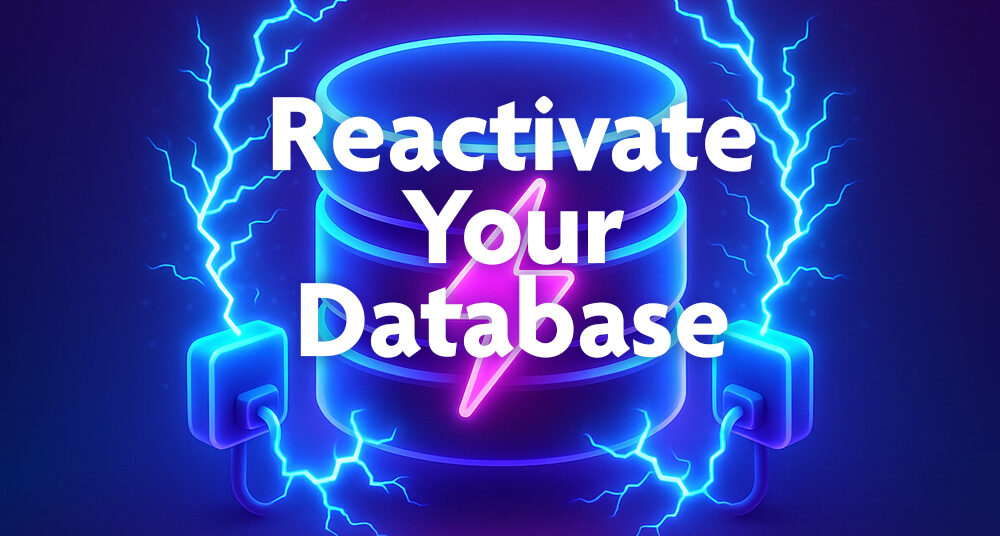AI Appointment Setter – Does it Work?
Customer relationship management is difficult at scale, but business owners still hesitate to trust an AI appointment setter with their lead qualification and appointment booking tasks. After all, these businesses paid big money to get these leads to engage with their business. Is it worth it to risk leveraging the qualification and appointment setting process to an AI? At CloseBot, we ran our own database reactivation with our own leads to see the exact numbers behind an AI SDR (Sales Development Representative). Database reactivations are among the most difficult sales tactics to manage client communications, because you’re dealing with a large number of simultaneous conversations. This is easy for AI like CloseBot.
You’ll find real numbers here. No hype, no drama, no false claims. Make sure you check out this blog here to see exactly how we set up this database reactivation AI appointment setter.
Yes an AI Appointment Setter Works
When it came time to analyze our numbers from August 27th to September 6th (no messages went out on weekends), it was obvious that the AI appointment setter performed better than any human would have. To prove this, let’s look at the total number of contacts we reached out to, the total number of replies sent by the CloseBot Agent and the total number of booked appointments from these reactivation conversations. In addition, we can take a look at indicators like the rate of contacts that needed at least 1 follow-up before having an AI appointment set and the cost of running this campaign.
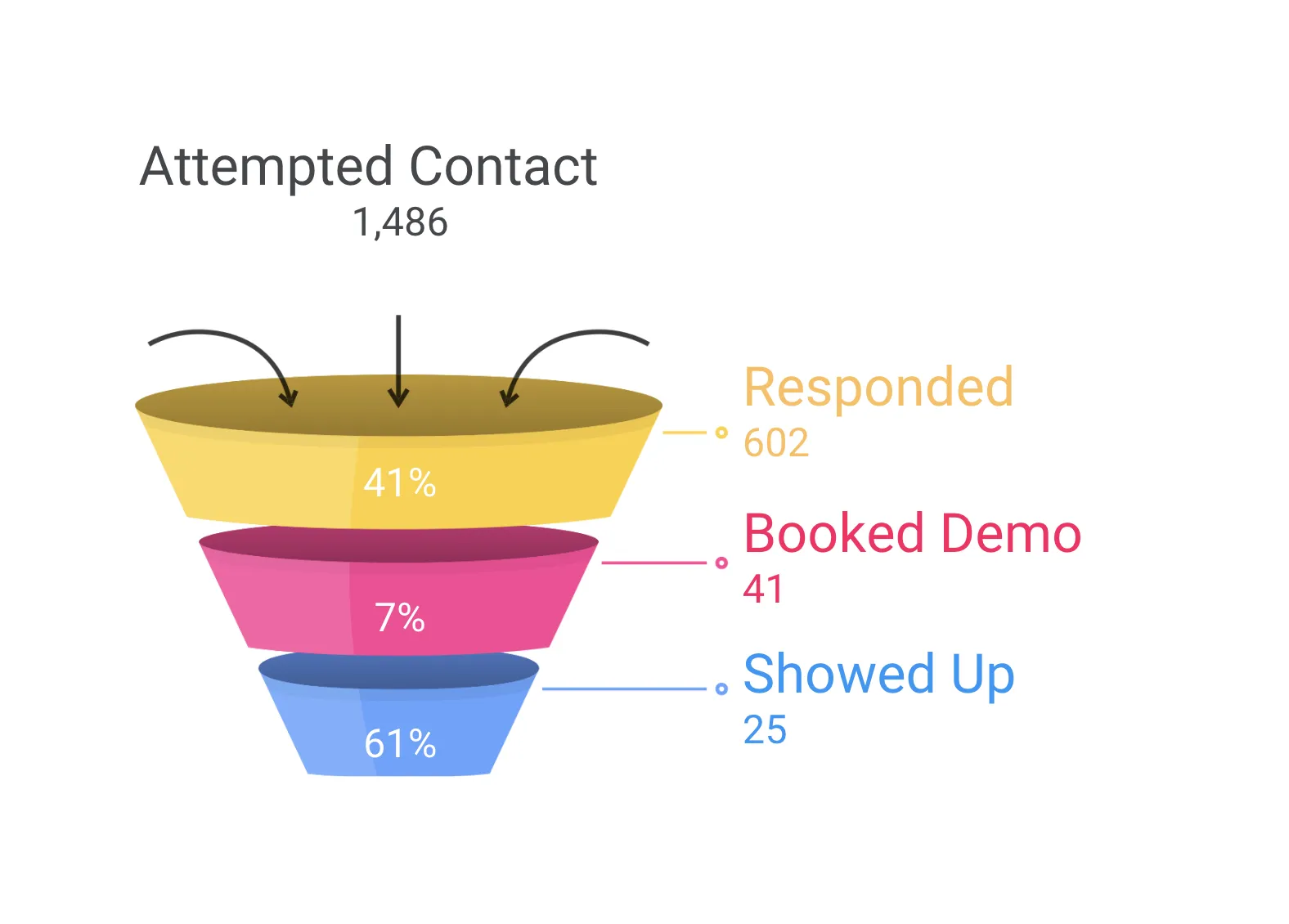
How Successful was the AI Appointment Setter?
The AI SDR ended up booking 41 appointments during the 9 day span out of 1,486 attempted reactivation contacts. That’s about a 3% rate of booked appointments from reactivating old leads that had previously signed up with CloseBot Classic (V1), but haven’t yet tried V2. While your own results may vary depending on lead and data quality and other factors, typically 2% to 5% appointment booking rate is expected.
Let’s deep dive into some of the funnel metrics.
Out of the 1,486 attempted reactivation contacts, 602 responded. Of those who responded, 41 booked a demo call so far.
AI SDR Reactivation Attempted Contact
Over 9 days our AI appointment setter attempted to contact 1,486 people who had signed up for a CloseBot Classic account over the past 3 years, but have yet to make a V2 account. We expect this phone data to be of high quality and the leads to be high positive intent since they previously made an account with us. If you’re running your own AI database reactivation campaign with lower quality leads, you may have to contact many more people to yield similar results.
If you want to see exactly how we set up our reactivation campaign in HighLevel and CloseBot, check out part 1 of this blog HERE.
Lead Response Rate
We send up to 3 messages to contacts, each one day after the previous, in an attempt to get a response. On average, it took 2 messages to get leads to respond. Just 38% of contacts who would eventually respond responded to the first text. It’s crucial that you send at least 2 messages before giving up contact when running your own database reactivation campaign with AI appointment scheduling.
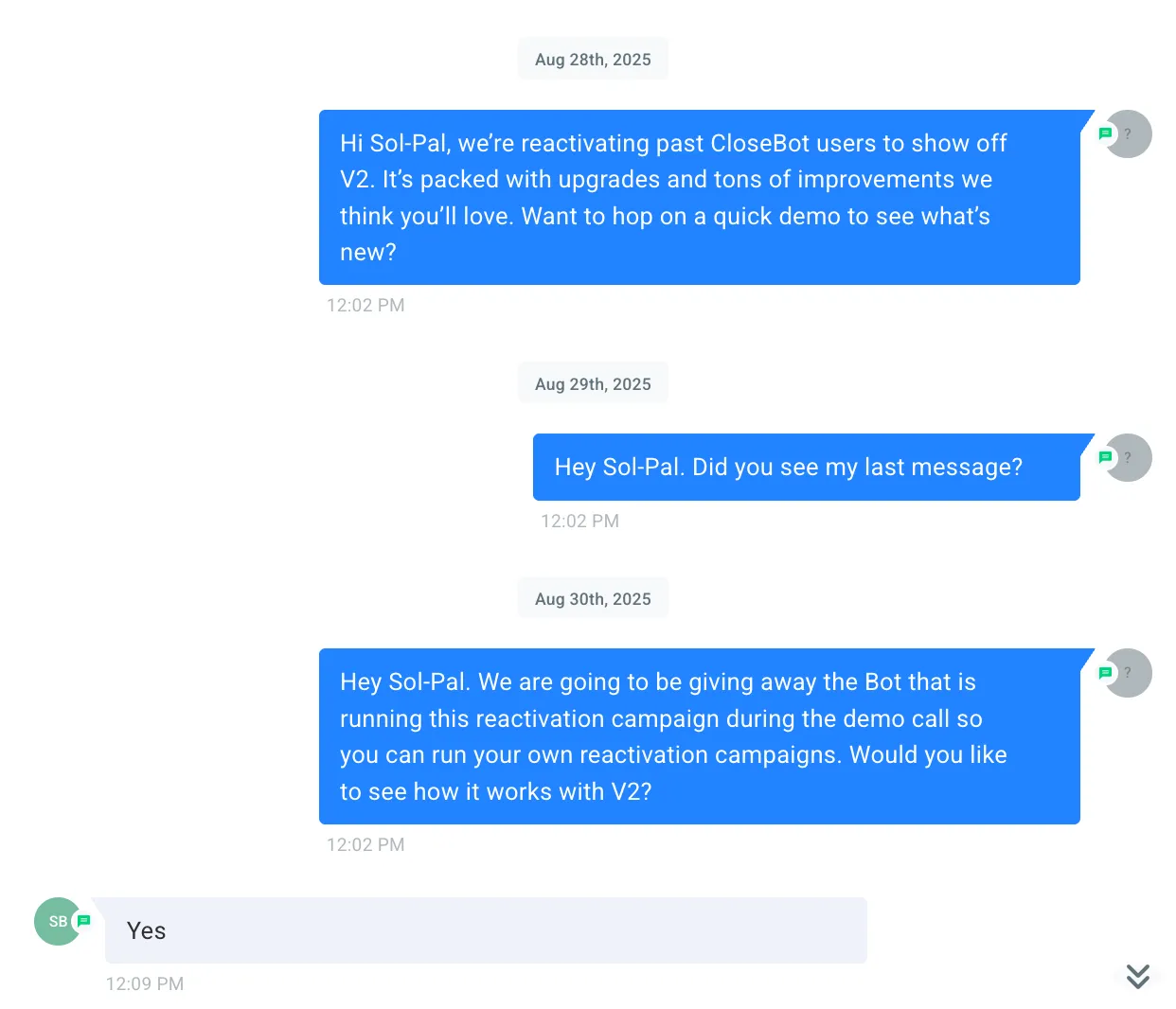
AI Appointment Scheduling Success Rate
Again, the success rate of these conversations depends on a few things: your request and how qualified you need the lead to be make a large difference in how successful your conversion rate will be. For us, these are already leads who were previously interested in our platform and we are asking them to schedule a free 30 minute demo call with us. This is a small ask with a positive intent audience. We would expect the success rate to be relatively high.
On average, those who booked an AI appointment with us received 8 responses from the CloseBot AI and 25% of those received at least one follow up from CloseBot after they became non-responsive at a certain point in the conversation.
Appointment Show Up Rate
Not everyone who books a call will end up showing up. In our case, 29% (12) of those who booked a demo call with us did not show up to the group demo. Of the no-shows, 25% (3) of them notified us that they would not be attending. Two of those ended up conversationally rescheduling with our AI SDR and 1 cancelled entirely. CloseBot’s ability to conversationally schedule, cancel and rebook with high accuracy is a huge revenue engine for agencies.
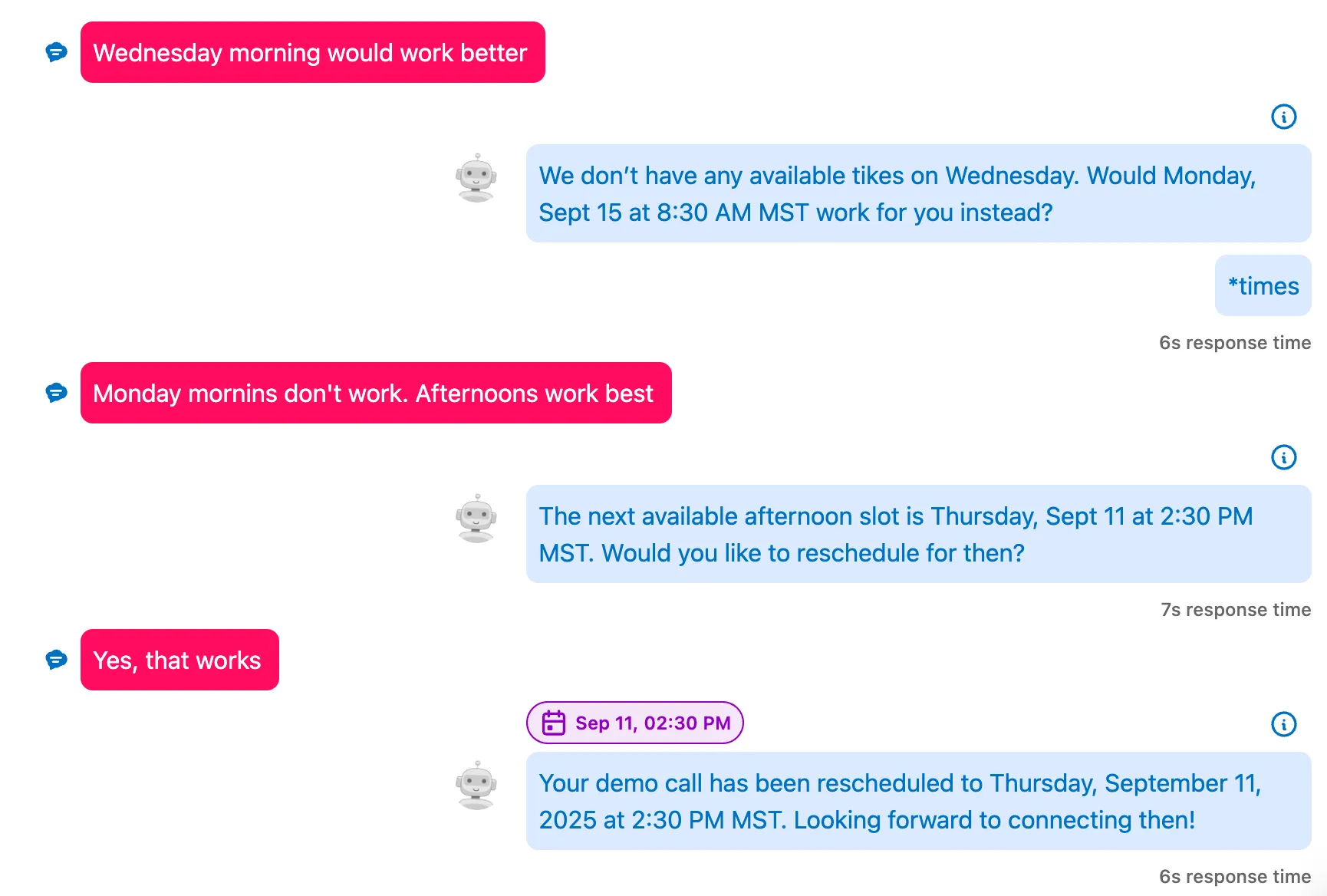
What are Lessons Learned?
It’s important to note that AI SDR deployed into the real world should be monitored. There are almost always areas of improvement. For our own AI appointment scheduling flow, for example, we noticed the AI had the following issues that we were able to improve on.
Fill Knowledge Base Gaps
One of the most common areas to watch out for are knowledge base gaps. CloseBot allows you to scrape your website or upload resources that your agent can pull information from as it qualifies leads and books appointments, but sometimes a lead will ask a question that isn’t covered. If you notice this happening, like we did in this example below, it’s important to upload or edit the knowledge base to include this information so it can answer that question in the future.
CloseBot is not intended to be used as a CRM replacement. It’s meant to boost your existing CRM’s capabilities (HighLevel and HubSpot). Here CloseBot’s agent did not have that information at hand, so it made its best guess. To fix this, we edited a text file within the knowledge base, telling it that CloseBot is integrated with HighLevel, HubSpot and other CRMs and not meant to be a CRM replacement.
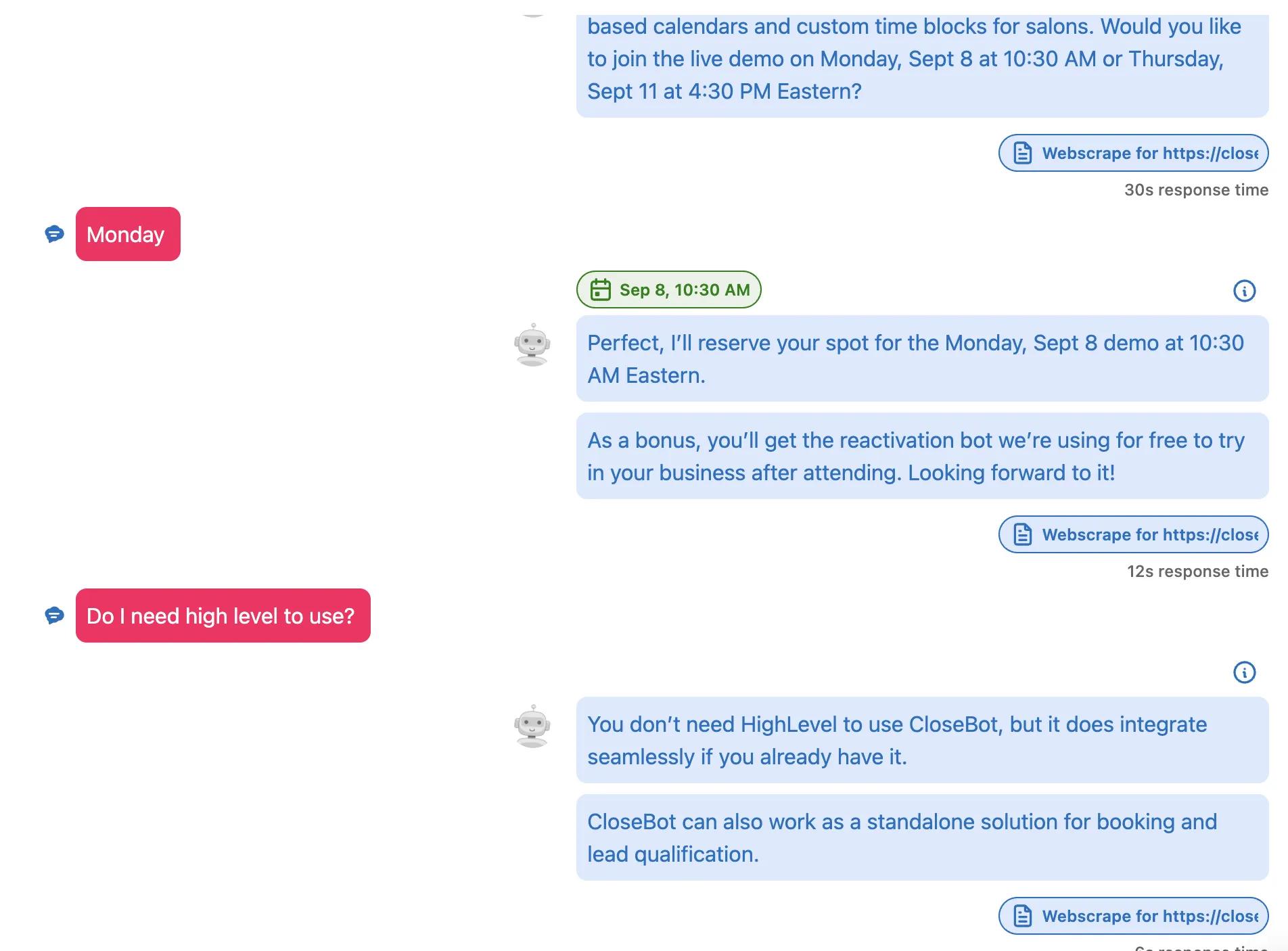
Adjust Conversation Flows to Reduce Friction
We also noticed that at our Determine Questions objective stage, the AI was adamant about the contact coming up with questions that we could answer for them during the free demo call. To fix this, all we had to do was instruct the agent within our Job Flow that they should attempt this objective just one time.
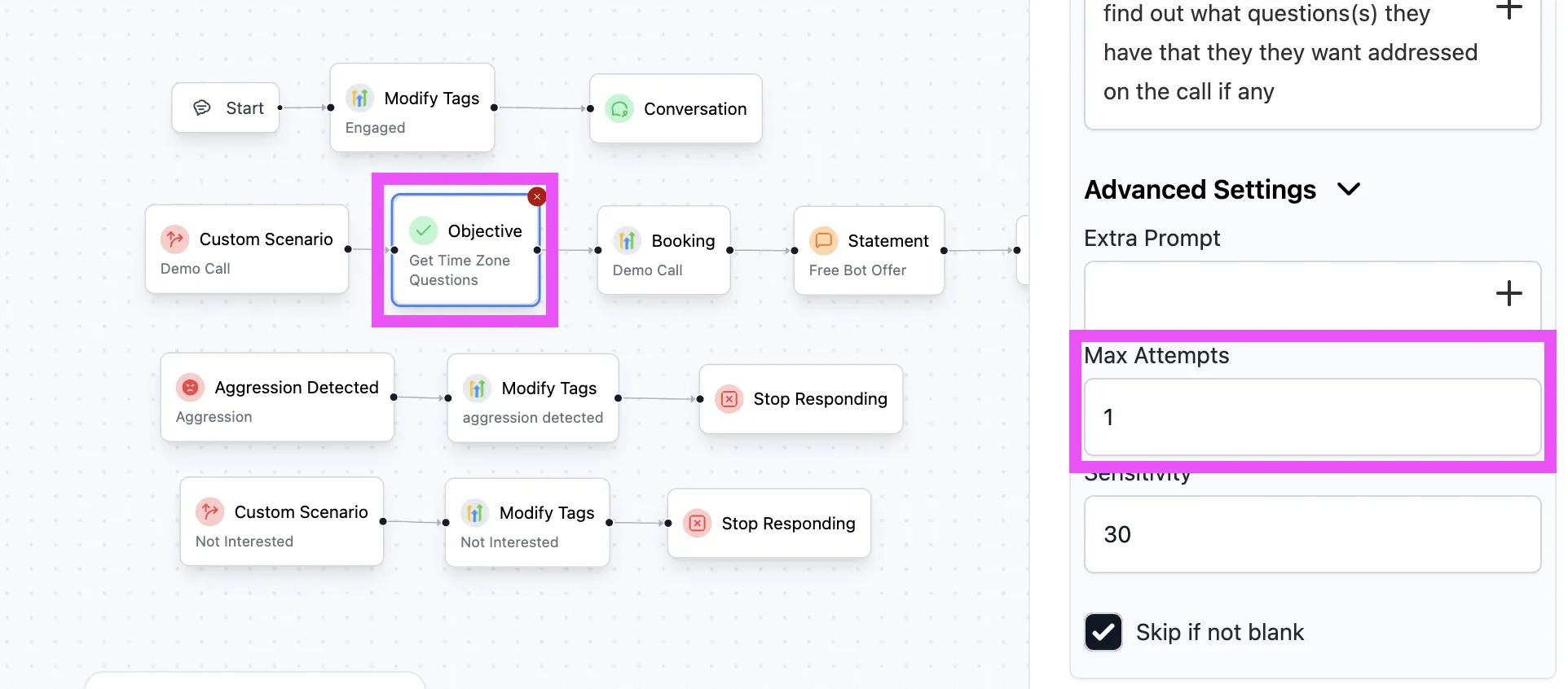
AI SDR Reactivation Summary
We have 18,000 total leads to reactivate with the CloseBot AI appointment setter. If we follow these same metrics over the duration of the campaign, that data will yield almost 500 demo appointments. We will slowly drip out the reactivation campaign over a period of approximately 8 weeks. This allows our SMS deliverability to remain high and keeps our group demo calls small enough that attendees don’t find it overly crowded.
You can run a database reactivation campaign yourself on a free account by signing up today! You can also CLICK HERE to download an AI SDR for database reactivation straight to your CloseBot account.
Frequently Asked Questions
How does an AI appointment setter improve lead qualification?
An AI appointment setter enhances lead qualification by automating the process of engaging with potential customers. It can analyze responses and categorize leads based on their level of interest and intent. By using predefined criteria and machine learning algorithms, the AI can prioritize high-quality leads, ensuring that sales teams focus their efforts on the most promising prospects. This not only streamlines the qualification process but also increases the efficiency of lead management, ultimately leading to higher conversion rates.
What are the cost implications of using an AI appointment setter?
The cost implications of using an AI appointment setter can vary based on the provider and the features included. Generally, businesses can expect to save on labor costs associated with manual appointment scheduling and follow-ups. Additionally, the increased efficiency and higher conversion rates can lead to a better return on investment. It’s essential to evaluate the pricing structure of the AI solution, including any subscription fees, usage costs, and potential additional charges for premium features, to ensure it fits within your budget.
Can an AI appointment setter be customized for specific industries?
Yes, many AI appointment setters offer customization options tailored to specific industries. This includes the ability to adjust conversation flows, messaging styles, and knowledge bases to align with industry-specific terminology and customer expectations. Customization ensures that the AI can effectively address the unique needs of different sectors, such as real estate, healthcare, or SaaS. By tailoring the AI’s capabilities, businesses can enhance engagement and improve the overall effectiveness of their appointment-setting efforts.
What role does data quality play in the success of an AI appointment setter?
Data quality is crucial for the success of an AI appointment setter. High-quality data ensures that the AI can accurately identify and engage with leads, leading to better response rates and appointment bookings. Poor data quality, such as outdated or incorrect contact information, can hinder the AI’s effectiveness and result in wasted outreach efforts. Regularly cleaning and updating your lead database is essential to maximize the performance of your AI appointment setter and achieve optimal results.
How can I ensure my AI appointment setter remains effective over time?
To ensure your AI appointment setter remains effective over time, it’s important to continuously monitor its performance and make necessary adjustments. Regularly review key metrics such as response rates, appointment bookings, and customer feedback. Update the AI’s knowledge base to fill any gaps and refine conversation flows based on user interactions. Additionally, stay informed about advancements in AI technology and consider periodic training sessions to enhance the AI’s capabilities, ensuring it adapts to changing market conditions and customer needs.
What are the best practices for integrating an AI appointment setter with existing systems?
Integrating an AI appointment setter with existing systems requires careful planning and execution. Start by ensuring compatibility with your current CRM and other tools. Utilize APIs for seamless data transfer and synchronization. Establish clear workflows that define how the AI will interact with your systems and staff. Additionally, provide training for your team to understand how to leverage the AI effectively. Regularly assess the integration’s performance and make adjustments as needed to optimize efficiency and user experience.
What types of businesses can benefit from using an AI appointment setter?
AI appointment setters can be advantageous for a wide range of businesses, particularly those that rely heavily on lead generation and customer engagement. Industries such as real estate, healthcare, and SaaS companies often see significant benefits. These businesses typically have large volumes of leads and require efficient follow-up processes. By automating appointment scheduling, they can save time, reduce human error, and improve overall conversion rates, allowing teams to focus on closing deals rather than administrative tasks.
How can I measure the effectiveness of my AI appointment setter?
To measure the effectiveness of your AI appointment setter, track key performance indicators (KPIs) such as the number of contacts reached, response rates, booked appointments, and show-up rates. Additionally, analyze the conversion rates from initial contact to appointment booking. Monitoring these metrics over time will help you identify trends, optimize your approach, and make data-driven decisions to enhance the performance of your AI system. Regularly reviewing these metrics will also allow you to adjust your strategies as needed.
What are the common challenges faced when implementing an AI appointment setter?
Common challenges when implementing an AI appointment setter include ensuring data quality, managing customer expectations, and addressing knowledge gaps in the AI’s responses. Poor data quality can lead to ineffective outreach, while customers may have concerns about the AI’s ability to handle complex inquiries. Additionally, if the AI lacks comprehensive knowledge about your services, it may struggle to provide accurate information. Continuous monitoring and updating of the AI’s knowledge base, along with clear communication with customers, can help mitigate these issues.
Can an AI appointment setter handle follow-ups effectively?
Yes, an AI appointment setter can handle follow-ups effectively by automating the process of sending reminders and additional messages to leads who have not responded. By utilizing a structured messaging sequence, the AI can engage contacts multiple times, increasing the likelihood of a response. However, the effectiveness of follow-ups depends on the quality of the initial outreach and the AI’s ability to adapt its messaging based on lead interactions. Regularly analyzing follow-up success rates can help refine this process.
Is it necessary to have a human oversee the AI appointment setter?
While AI appointment setters can operate autonomously, having a human oversee the process is beneficial. Human oversight ensures that the AI is functioning correctly, addresses any unexpected issues, and provides a safety net for complex inquiries that the AI may not handle well. Additionally, human involvement can help refine the AI’s knowledge base and improve its conversational flow. Regular monitoring allows businesses to optimize the AI’s performance and enhance customer satisfaction.
What should I consider when choosing an AI appointment setter?
When choosing an AI appointment setter, consider factors such as integration capabilities with your existing CRM, ease of use, customization options, and the quality of customer support. It’s also important to evaluate the AI’s ability to handle your specific industry needs and its track record of success. Look for user reviews and case studies to gauge effectiveness. Finally, ensure that the pricing model aligns with your budget and expected return on investment.
